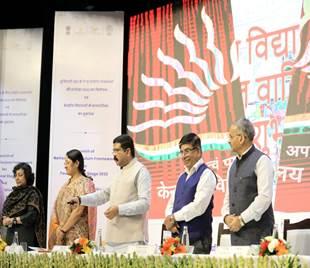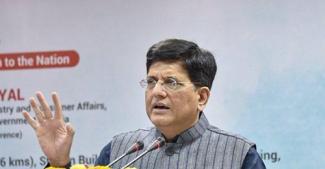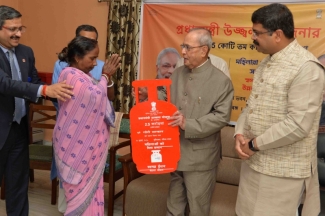
Initiatives launched today will help equip our young ones with cognitive & linguistic competencies of the 21st century- Shri Dharmendra Pradhan
Union Education and Skill Development & Entrepreneurship Shri Dharmendra Pradhan today launched the National Curriculum Framework for Foundational Stage and the pilot project of Balvatika 49 Kendriya Vidyalayas across the country. Smt. Annapurna Devi, MoS for Education; Dr. Subhash Sarkar, MoS for Education along with Secretary, School Education, Smt Anita Karwal; Secretary, Youth Affairs and Sports Shri Sanjay Kumar; Director, NCERT, Shri Dinesh Saklani; Members of the Steering and Mandate Committee of NCF and senior officials of Ministry of Education were present on the occasion. Chairman, Members of the Steering and Mandate Committee of NCF, Shri K. Kasturirangan also attended the event virtually.
Speaking on the occasion, Shri Pradhan said that today is a landmark day towards fulfilling objectives of NEP. The ‘yagya’ and churning that India witnessed in the last 8 years has started to bear ‘Amrit’. He further said that Foundational, Preparatory, Middle & Secondary are the four stages of NCF for school education. Developing the foundational framework was one of the most important and challenging aspect under NEP 2020, as it has a huge bearing on shaping the future of our country, he added.
He complimented everyone who has contributed to the development of National Curriculum Framework for foundation stage. This new framework will help equip our young ones with cognitive & linguistic competencies of the 21st century, he said. The Minister urged NCERT to place this NCF in public domain, take it to SCERTs and to all stakeholders involved in early childhood care and development.
While speaking on the occasion, Dr Kasturirangan, Chairperson of National Steering Committee to develop NCF said that the Foundational stage NCF was the first integrated NCF of the country for ages 3-8 years and is set to transform quality of education through holistic approach.
The National Education Policy 2020 -- that is NEP 2020 -- is transforming education in India. It has set our education system on a path to delivering the highest quality education for all, with equity and inclusion. Amongst the most transformative aspects of NEP 2020 is the new 5+3+3+4 curricular structure which integrates Early Childhood Care and Education for all children of ages 3 to 8. Early childhood lays the foundation for life-long learning and development - it is a key determinant of the quality of overall life. This framework is expected to deliver the highest quality Foundational Education, across all types of institutions in the country.
As articulated in NEP 2020, National Curriculum Framework for Foundational Stage, uses ‘play,’ at the core of the conceptual, operational, and transactional approaches to curriculum organization, pedagogy, time and content organization, and the overall experience of the child.
Children learn best through play, hence learning envisaged by the National Curriculum Framework will provide stimulating experiences for the child’s development in all dimensions – cognitive, social-emotional, physical, and will also enable the achievement of Foundational Literacy and Numeracy for all our children.
The NCF has an institutional focus, the importance of the home environment cannot be overemphasized - including family, extended family, neighbours, and others in the close community - all of whom have a very significant impact on the child, particularly in this age cohort of 3-8 years. Hence, this NCF will deal with the role of teachers as well as parents and communities in enabling and enhancing the developmental outcomes that are sought during this stage.
Balvatika Classes for students in the age groups of 3+, 4+ and 5+ years of age is being introduced in a set of 49 Kendriya Vidyalayas. Since more than 85% of a child’s cumulative brain development occurs prior to the age of 6, providing appropriate care to stimulate their brain and support their physical and emotional development is essential for every child. All these engagements are aimed at achieving the three developmental goals of
- maintaining good health and well-being,
- becoming effective communicators; and
· becoming involved learners.
Kindly see the link below to access National Curriculum Framework for the Foundational Stage:https://ncert.nic.in/pdf/NCF_for_Foundational_Stage_20_October_2022.pdf











